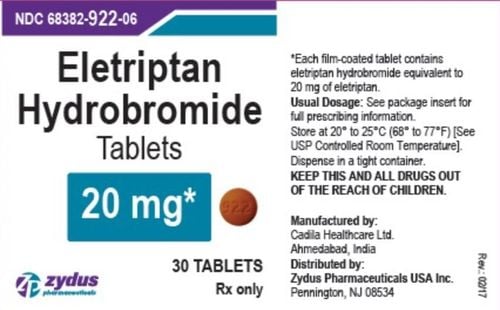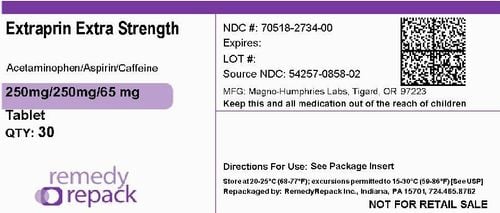This is an automatically translated article.
Atogepant belongs to the class of calcitonin gene-related Peptide receptor (CGRP) receptor antagonists. Atogepant is used for prescription for symptomatic treatment of migraine.
1. Effects of Atogepant
Atogepant is a medicine used to prevent migraine attacks in adults. Atogepant is also used for purposes not listed in this medication guide.
Atogepant is an oral antagonist of calcitonin gene-related peptide (CGRP) receptors indicated for the prevention of episodic migraine.
In patients requiring migraine preventive therapy, current practice guidelines recommend the use of certain antiepileptic drugs (eg, valproic acid or topiramate) or beta blockers (eg, propranolol) ), all of which can cause significant side effects. The group of "gepants," which includes atogepant, are relatively well-tolerated and may provide a desirable treatment option for patients struggling with adverse reactions to other preventive therapies.
Atogepant helps prevent migraine by antagonizing the activity of a gene receptor molecule (CGRP) that is involved in the pathophysiology of migraine. Intended to be used for the prevention, rather than treatment of, abortive migraines, atogepant is administered once daily.
Although no dose adjustment is required for patients with mild or moderate hepatic impairment, atogepant should be avoided in patients with severe hepatic impairment. Similarly, no dose adjustment is required for patients with mild or moderate renal impairment, but patients with severe renal impairment should be limited to a maximum daily dose of 10 mg.
Atogepant is an antagonist of the calcitonin gene-related peptide receptor - it competes with CGRP for these receptors, blocking the actions of CGRP and its ability to induce and prolong migraine pain .
2. How to use Atogepant
2.1. Use Atogepant correctly Use atogepant exactly as directed by your doctor. Do not use more nor use it more often than directed. Using too much atogepant can increase your risk of side effects.
Do not use atogepant for a headache other than your usual migraine. Ask your doctor what to do about frequent headaches.
Ask your doctor first about any other medicine you can take if atogepant doesn't work. After you have taken another medicine, check with your doctor as soon as possible. Headaches that are not relieved by atogepant are sometimes caused by medical conditions that require another treatment.
What if you miss a dose: Take your medicine as soon as you remember you missed a dose, but skip it if it is almost time for your next dose. Do not take two doses at the same time. What happens if you overdose: Call your doctor right away for instructions in the event of an overdose. 2.2. Dosage of Atogepant Dosage of atogepant will be different for each different patient. Follow the prescription and strictly follow the instructions of the doctor. The following information includes only the average doses of atogepant. If the patient's dose is different, do not change the dose on your own unless the doctor prescribes a change for the patient to use.
The amount of medication the patient takes depends on the strength of the drug. In addition, it also depends on the number of doses the patient takes each day, the time allowed between doses and the length of time the patient takes the drug depends on the condition that the patient is needing to use the drug.
Adults: Take one tablet once a day. Each tablet contains 10, 30, or 60 milligrams (mg) of atogepant. Children: Dosage and administration need to be prescribed by a doctor.
3. Contraindications of Atogepant
Patients need to tell the doctor what medicines they are taking, because many drugs can affect atogepant, especially:
Cyclosporine ; antibiotics such as clarithromycin or rifampin ; antifungal medicine such as ketoconazole or ketoconazole; antiretroviral drugs to treat HIV, such as efavirenz or etravirine; or Seizures such as carbamazepine or phenytoin . The above medicines are not a complete list of medicines and many other drugs can also affect atogepant. This includes prescription and over-the-counter medicines, vitamins, and herbal products. Not all possible drug interactions are listed here.
Some medications should not be taken at or around the time of eating or eating certain foods, as interactions are very likely. Using alcohol or tobacco with certain medications can also cause interactions. Ask your doctor about taking your medicine with food, alcohol, or tobacco.
When deciding to use any drug, there are always side effects, but the patient and the doctor will consider the effect that the drug brings to the patient. For atogepant, note the following:
Allergies: Tell your doctor if you have ever had any unusual or allergic reaction to atogepant or any other medicine. Children: Appropriate studies have not been performed on the relationship of age to the effects of atogepant in the pediatric population. Safety and effectiveness have not been determined. Geriatric: Appropriate studies performed to date have not demonstrated geriatric-specific problems that would limit the usefulness of atogepant in the elderly. However, elderly patients are more likely to have age-related liver, kidney, or heart problems, which may require caution and an adjustment in the dose for patients receiving atogepant. Lactation: There are no adequate studies in women to determine the risk to the infant when using this medicine while breast-feeding. Weigh the potential benefits against the possible risks before taking this medication while breast-feeding.
4. Notes when using Atogepant
Patients need to be checked by a doctor regularly. This will allow your doctor to see if the medicine is working properly and to decide whether to continue using it.
If the person's symptoms do not improve within a few days or if the condition worsens, check with the doctor.
Do not take other medicines unless the patient has asked the doctor. This includes prescription or over-the-counter (over-the-counter [OTC]) and herbal (for example, St. John's wort) or vitamin supplements.
5. Atogepant side effects
Besides the effects, Atogepant can cause some unwanted effects. Although not all of these side effects are possible, if they do, you may need a doctor's care.
There are some possible side effects that do not usually require medical attention. Because these side effects may disappear during treatment as the patient's body adapts to the drug. In addition, your doctor can tell you about ways to prevent or reduce some of these side effects. Tell your doctor if any of these side effects continue or are bothering you, if you have any questions about them:
More common: Constipation , nausea, drowsiness or unusual drowsiness, unusual tiredness or weakness Uncommon: Decreased appetite, weight loss Other side effects, although not listed, may occur in some patients. If the person notices any other effects, let the doctor know.
6. How to store Atogepant
Store the medicine in the sealed container at room temperature, away from heat, moisture and direct light. Do not store the medicine in the refrigerator or freeze. Keep out of reach of CHILDREN. Do not keep medicine that has expired or is no longer needed. Atogepant belongs to the class of calcitonin gene-related peptide (CGRP) receptor antagonists. Atogepant is used for prescription for the symptomatic treatment of migraine headaches. To ensure the effectiveness of treatment and avoid unwanted side effects, patients need to strictly follow the instructions of the doctor, professional pharmacist.
Follow Vinmec International General Hospital website to get more health, nutrition and beauty information to protect the health of yourself and your loved ones in your family.
Please dial HOTLINE for more information or register for an appointment HERE. Download MyVinmec app to make appointments faster and to manage your bookings easily.













